It seems like everyone’s talking about this Chuck Wendig dude. Everyone but you, that is. And that’s a damn shame because Chuck Wendig is ten shades of great. On one hand, as a guy who’s done self-publishing, traditional publishing, and digital publishing (not to mention scripts and video games), he’s written a ton of stuff so you have plenty of titles to choose from. On the other, where the hell do you even start? Ah, my friend, that’s where I come in. Sit back, relax, and let me introduce you to your new favorite author.
Chuck Wendig writes like a punch to the face. His words are visceral and pungent, his tales discomfiting and nonconforming. There’s a fevered, staccato-like quality to his text which gives a sense of urgency, both for the characters and the reader. He writes characters who reject the norm even when they secretly crave it and rage against the family and friends they need the most, all while remaining imminently relatable and recognizable. Every time it feels like things can’t get any worse, Wendig turns the screw once more. Some writers can write big action sequences that make you feel like you’re part of the chaos and some can craft moments of quiet reflection between characters that make you feel like a fly on the wall. Chuck Wendig is one of those lucky few who can do both.
It’s not schadenfreude that keeps eyes glued to the page but a desire to follow the characters to the ends of the earth. No matter how weird or dark his stories get he never sacrifices a character’s personality for shock value. Stories are built around the characters, not the other way around. Even when the action gets really heavy it’s still all about Mookie Pearl or Miriam Black or Sinjir Rath Velus, how they’ll react or reject, coerce or connive, or beg, borrow, or steal to make it through the end.
I came late to the Wendig party but better late than never. Aftermath was my gateway drug—and the book of his I recommend the most frequently—and it’s been a steep and rapid descent into his oeuvre ever since. If you need some cracking good reads this summer, you’ll have more than enough to pick from here. The short and sweet version is Irregular Creatures for a sampling of his style, Zer0es for his best work to date, and Aftermath or Blackbirds for his most accessible. Or dig a little deeper…
Loners and Losers
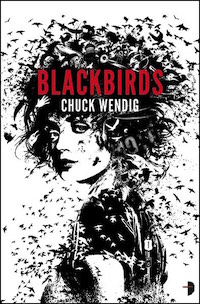 Wendig introduces Miriam Black in Blackbirds, and we’re now up to six books released or scheduled, plus “Interlude: Swallows,” a short story that appeared in the Three Slices anthology. How to describe Miriam…think Faith but instead of being a slayer she has the ability to see how people die. She’s also way angrier. She thinks of her gift as a curse and reacts accordingly. In the first book she fears and hates her powers, especially when a person she unexpectedly cares about gets caught in its crossfire. Miriam is the badass female urban fantasy anti-hero you’ve been waiting for. Too bad the TV show never made it past the greenlight stage. If only AMC would pick up the tab. Pairing Miriam Black with Tulip O’Hare would make a killer Sunday night.
Wendig introduces Miriam Black in Blackbirds, and we’re now up to six books released or scheduled, plus “Interlude: Swallows,” a short story that appeared in the Three Slices anthology. How to describe Miriam…think Faith but instead of being a slayer she has the ability to see how people die. She’s also way angrier. She thinks of her gift as a curse and reacts accordingly. In the first book she fears and hates her powers, especially when a person she unexpectedly cares about gets caught in its crossfire. Miriam is the badass female urban fantasy anti-hero you’ve been waiting for. Too bad the TV show never made it past the greenlight stage. If only AMC would pick up the tab. Pairing Miriam Black with Tulip O’Hare would make a killer Sunday night.
Looking for some updated cyberpunk? Zer0es is right up your alley, then. A gaggle of hackers are kidnapped by a mysterious group and blackmailed into hacking a range of seemingly unrelated companies and people. But once the “Zeroes” figure out how it’s all connected and who—or what—is really running the show, the chances of them making it out alive get slimmer by the day. I loved this book way more than Tor.com’s reviewer, but that’s mostly because I wasn’t put off by some of the more, ahem, hacky elements. I love it when writers turn a trope on its head, and Wendig does that here. Sure, the story’s a bit overstuffed, but the rapidfire pacing, interestingly diverse quintet, and twisting plot kept me hooked. The sequel is out soon and can’t release fast enough as far as I’m concerned.
Spooks, Mooks, and Kooks
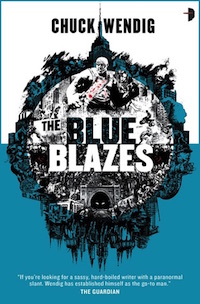 In The Blue Blazes, Mookie Pearl brings the reader into a world where New York City is literally a Hellmouth. The Organization runs all major vice, including magic, and Mookie is one of their best enforcers. Until his rebellious daughter, Nora, kicks up trouble, that is. Corruption infiltrates the mob and as the bodies pile up Mookie and Nora are the only ones who can clean it up. If they don’t get killed by hungry goblins, venomous monsters, and vengeful gods first. For those wanting another hit of that sweet, sweet Dresden-style urban fantasy, this should satisfy. It’s a helluva lot darker and more violent than the Dresden Files, but there’s a familiar brand of gallows humor, plucky and/or two-faced sidekicks, and uncontrollable magic.
In The Blue Blazes, Mookie Pearl brings the reader into a world where New York City is literally a Hellmouth. The Organization runs all major vice, including magic, and Mookie is one of their best enforcers. Until his rebellious daughter, Nora, kicks up trouble, that is. Corruption infiltrates the mob and as the bodies pile up Mookie and Nora are the only ones who can clean it up. If they don’t get killed by hungry goblins, venomous monsters, and vengeful gods first. For those wanting another hit of that sweet, sweet Dresden-style urban fantasy, this should satisfy. It’s a helluva lot darker and more violent than the Dresden Files, but there’s a familiar brand of gallows humor, plucky and/or two-faced sidekicks, and uncontrollable magic.
Speaking of tweaking tropes, Double Dead tackles three in one go: the post-apocalyptic road trip, vampires, and the zombie apocalypse. Coburn comes out of his vampiric hibernation to find humans overrun by a zombie plague. He hooks up with a group of survivors headed for sunny California and he becomes their muscle in exchange for a constant supply of blood. Coburn is an anti-hero with heavy emphasis on the “anti” part, and while his co-star is a teenage girl named Kayla this book is very far from YA-friendly. It’s gruesome, violent, and profane in terrible, beautiful ways. This is definitely not for the faint of heart, but if you’re looking for a nice new zombie to play with, Double Dead (and the novella Bad Blood) are the way to go.
In Spaaaaaaaaace!
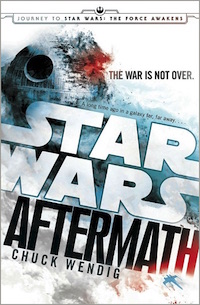 Obviously Aftermath was going to make it on this roundup, and rightfully so. Besides being a rollicking space adventure it’s tapped into something culturally broad enough for even SF dabblers to get on board. The story is set in the period shortly after the Battle of Jakku as the New Republic asserts itself and the vestiges of the Empire begins its eventual mutation into the First Order. There are space pirates, rogue warriors, morally ambiguous assassins, traitorous villains, ace pilots, tech savants, bizarro aliens, and killer robots filling out a sizzling trilogy (the second book is due out in July and the third next year). Don’t buy into the naysayers and trolls. This book drew the ire of haters mostly because two middle aged woman are the main protagonist and antagonist, a boy has a pair of lesbian aunts, and a soldier is also a gay dude. If you like Star Wars, military/space/adventure fiction, or good books in general, you’re welcome.
Obviously Aftermath was going to make it on this roundup, and rightfully so. Besides being a rollicking space adventure it’s tapped into something culturally broad enough for even SF dabblers to get on board. The story is set in the period shortly after the Battle of Jakku as the New Republic asserts itself and the vestiges of the Empire begins its eventual mutation into the First Order. There are space pirates, rogue warriors, morally ambiguous assassins, traitorous villains, ace pilots, tech savants, bizarro aliens, and killer robots filling out a sizzling trilogy (the second book is due out in July and the third next year). Don’t buy into the naysayers and trolls. This book drew the ire of haters mostly because two middle aged woman are the main protagonist and antagonist, a boy has a pair of lesbian aunts, and a soldier is also a gay dude. If you like Star Wars, military/space/adventure fiction, or good books in general, you’re welcome.
For the Young’uns
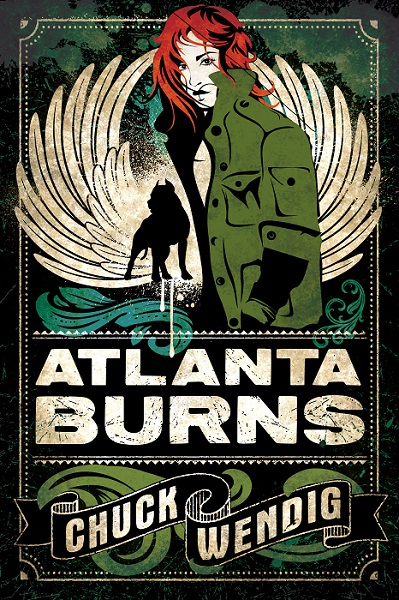 Atlanta Burns is a YA/crime novel with fire in its belly, pun definitely intended. Atlanta is no wilting wallflower pining over a cute boy while another opposing cute boy pines over her. Atlanta is already ostracized for taking revenge against a terrible crime that’s committed against her at the opening of the book, but when she gets tangled up in a battle of bullies she has to decide once more whether or not to enact her own vigilante justice. It’s a story that assumes teens can handle some tough talk and hard themes. There’s a lot going on here including bullying, suicide, sexual assault, emotional trauma, and gun violence, but I’d argue it’s not much further afield than, say The Hunger Games or Twilight. In fact, given how deftly it shows Atlanta learning how to navigate the complexities of racism, sexism, and homophobia, it’s a better read than either of those books. I don’t believe in coddling teenagers, and while I probably wouldn’t hand it to a conservative 12-year-old I’d certainly offer it up to an older teen with a voracious reading appetite.
Atlanta Burns is a YA/crime novel with fire in its belly, pun definitely intended. Atlanta is no wilting wallflower pining over a cute boy while another opposing cute boy pines over her. Atlanta is already ostracized for taking revenge against a terrible crime that’s committed against her at the opening of the book, but when she gets tangled up in a battle of bullies she has to decide once more whether or not to enact her own vigilante justice. It’s a story that assumes teens can handle some tough talk and hard themes. There’s a lot going on here including bullying, suicide, sexual assault, emotional trauma, and gun violence, but I’d argue it’s not much further afield than, say The Hunger Games or Twilight. In fact, given how deftly it shows Atlanta learning how to navigate the complexities of racism, sexism, and homophobia, it’s a better read than either of those books. I don’t believe in coddling teenagers, and while I probably wouldn’t hand it to a conservative 12-year-old I’d certainly offer it up to an older teen with a voracious reading appetite.
No Attention Span? No Problem!
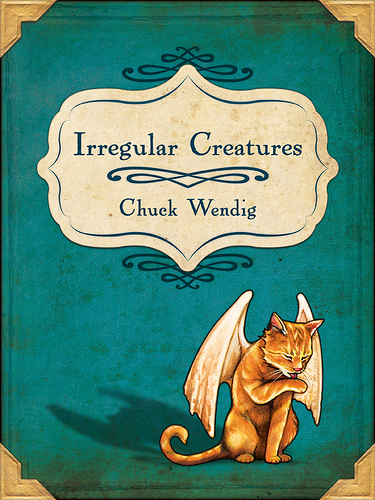 Irregular Creatures is one of my favorite of Wendig’s books. It’s a collection of short genre-y stories that, tonally speaking, fit somewhere in between Neil Gaiman’s The Little Gold Book of Ghastly Stuff and Joe Hill’s 20th Century Ghosts. Each tale is a little wacky and a whole lot weird with a spash of Twilight Zone for creepy measure.
Irregular Creatures is one of my favorite of Wendig’s books. It’s a collection of short genre-y stories that, tonally speaking, fit somewhere in between Neil Gaiman’s The Little Gold Book of Ghastly Stuff and Joe Hill’s 20th Century Ghosts. Each tale is a little wacky and a whole lot weird with a spash of Twilight Zone for creepy measure.
I don’t know anything about Hyperion the superhero other than he’s basically Marvel’s knockoff version of Superman, but so far so good with Hyperion #1 (artist Nik Virella, colorist Romulo Fajardo, letterer Joe Caramagna). There’s a lot reminiscent of Blackbirds here—young woman hitchhiking away from her past, male trucker attempts a rescue and gets caught up in her shit, violence and manipulation of gender politics ensure—but with the twist of capes and supervillains.
Your Inner Penmonkey
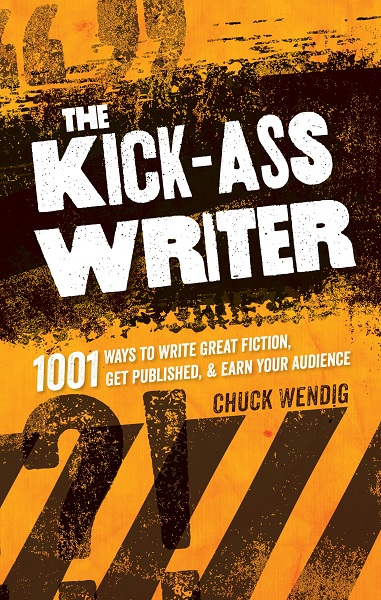 For those in need of some writing advice, The Kick-Ass Writer: 1001 Ways to Write Great Fiction, Get Published, and Earn Your Audience is here. This book is perfect for people needing practical craft and publishing guidance. It steers clear of the sort of unfounded writerly advice like “write what you know” in favor of actual useful advice on how to set up a story arc, establishing and describing characters, and the arduous process of publishing. With tips like “Embrace Your Inner Moonbat” and “Theme and Character: Car Crash or Pubic Braid? You Decide!” it may be a bit hard to take him seriously, but trust me, it is chockablock with vital recommendations. As a writer working on a few novels myself, The Kick-Ass Writer lives at my desk and is practically my writing bible. And don’t forget to check out his blog at terribleminds.com for more great articles on writing and other miscellaneous topics.
For those in need of some writing advice, The Kick-Ass Writer: 1001 Ways to Write Great Fiction, Get Published, and Earn Your Audience is here. This book is perfect for people needing practical craft and publishing guidance. It steers clear of the sort of unfounded writerly advice like “write what you know” in favor of actual useful advice on how to set up a story arc, establishing and describing characters, and the arduous process of publishing. With tips like “Embrace Your Inner Moonbat” and “Theme and Character: Car Crash or Pubic Braid? You Decide!” it may be a bit hard to take him seriously, but trust me, it is chockablock with vital recommendations. As a writer working on a few novels myself, The Kick-Ass Writer lives at my desk and is practically my writing bible. And don’t forget to check out his blog at terribleminds.com for more great articles on writing and other miscellaneous topics.
Alex Brown is an archivist, research librarian, writer, geeknerdloserweirdo, and all-around pop culture obsessive who watches entirely too much TV. Keep up with her every move on Twitter and Instagram, or get lost in the rabbit warren of ships and fandoms on her Tumblr.










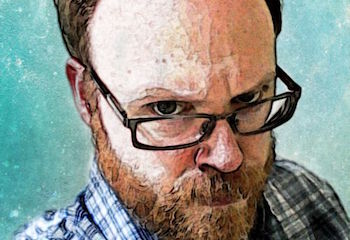
I actually went through a majority of the one-star reviews on Amazon for Star Wars: Aftermath, and I only found a few that mentioned the issues you described (women and LGBT characters). Most of the reviews focused on the choppy, present-tense style that made the book frustrating to read. That was my major complaint with the book, too, and it aggravated me to see reviewers, articles, and Wendig himself slamming Star Wars fans for being “homophobic” or “misogynistic” because they didn’t like a book that, frankly, just wasn’t well written.
Wendig bragged about writing the book in 45 days and then hid behind the homophobia/misogyny defense when readers didn’t like it (which is bogus because there was a lesbian character, Delian Mors, in Paul S. Kemp’s Star Wars: Lords of the Sith, and fans didn’t make a big deal about that). That behavior alone is enough to turn me off from reading any more of his books.
I have to agree with Anne on this one. I picked up Aftermath because I was curious to find out where the Star Wars story went, to learn more about the build-up from Episode VI to Episode VII. I liked the plot. I liked the characters, even. I did not like the writing itself. It was so incredibly choppy that I found it painful to read. It got to the point where I was dreading my regular reading time, instead of looking forward to it. I managed to finish the book, but it took a considerable effort of the will. The fact that it had homosexual characters and female leads had nothing to do with my dislike of the book.
If Aftermath is being presented as one of Mr. Wendig’s better novels, I have to say that I have no interest in reading any of his other work.
Aftermath didn’t do it for me personally (not a big Star Wars fan), but I love the Miriam Black and Mookie Pearl books especially. One of my favorite authors, hands down. Thanks for this write-up.
I love Star Wars, so I picked up Aftermath. Then I immediately (50 or so pages in) dropped it. I wanted to like it, and I tried so hard to, but the present-tense style and minimum-length sentences were just awful. I’m sure some like it, but to me it just seemed poorly written.
As for the claims of misogyny and/or homophobia: …what?
Most putdownable book I’ve (almost) read.
A punch in the face would have been preferable to his Star Wars book. Has anyone rewritten Aftermath in standard past tense so as to make it readable yet? It is the worst advert for his writing possible.
His newest book coming up August 16th, Invasive, is creepy crawly good. It’s about genetically engineered killer ants, and it made me itchy! Review will be posted early August on Pop Culture Beast (http://www.popculturebeast.com)Definitely one to add to the buy list.
It’s undeniable that there was a concerted campaign of Rabid Puppy types and Expanded Universe purists to downvote Aftermath‘s Amazon rating. While they don’t come out and say in it in their one-star reviews, naturally, you can see them planning it on Twitter and Facebook, motivated by Wendig’s progressive characters, his friendship with Puppy bête noire John Scalzi, and Wendig being the first new author to overwrite Timothy Zahn’s now-non-canon Return of the Jedi followup. I had a lengthy debate with half a dozen of them in the comments of my own Amazon review, in which they finally admitted that they just didn’t like Wendig personally, and hadn’t, in some cases, even read Aftermath.
That doesn’t mean that there aren’t some people who legitimately disliked Aftermath. This is fine. I found it engaging and pulpy and worlds better than Zahn’s generic and leaden prose, but I’m not the boss of other readers. I confess to being baffled by the response to the present tense, though. It’s a transparent (to me) authorial choice that conveys immediacy, but a lot of readers react to it like Wendig set their pants on fire. Ditto sentence fragments, which can be found from Raymond Chandler to Cormac McCarthy. I’m not sure what it says that so many Star Wars readers found very mildly modern prose choices so impenetrable; I know some of the Puppies and EU purists chose it as the consensus fig leaf for their campaign, but clearly there are plenty of legitimate readers who just couldn’t engage with it. It’s baffling, as I said, because it barely registered with me. Those who bounced off Aftermath definitely shouldn’t read, say, The Orange Eats Creeps.
I thought the best parts of Aftermath were the interludes, which implied a lot about the state of the galaxy in a deft and economical way. I can legitimately say it was the first Star Wars tie-in I actually enjoyed reading.
Yeah, if you’re a casal Star Wars fan (I.e., you don’t read all the books out of a sense of obligation, but are interested in reading some of them), don’t even touch Aftermath. Go get Bloodline, A New Dawn, Battlefront: Twilight Company, Servants of the Empire, or, if you aren’t worried about the books conforming to the new films, Timothy Zahn’s Thrawn Trilogy (and his other books), Kenobi, Yoda: Dark Rendezvous, or, for a lore deep-dive, Darth Plagueis.
All of these are infinitely better written and far less choppy. And many of them also prominently include “teh wimmens” and (especially recently) “teh gays,” and nobody cares in or out of univers.
Aftemath aside, I regularly enjoy Wendig’s work. Irregular Creatures made me run To my Kindle To find more.
Just an addendum to the last comment:
Claudia Gray’s Star Wars:Bloodline features several middle-aged (and younger and older) women as the main characters (both pro- and antagonists), a minor character in a gay, explicitly sexual relationship, (though the book itself isn’t explicit, to be clear), confirmation of multiple universally-recognized genders, and lots of racial diversity. (Aka, every reason you, and Wendig, think people dislike his book)
It’s also one of the most universally-praised Star Wars books ever, even among people who have philosophical problems with some of those ideas. It’s absolutely fabulous.
The real problem is, without doubt, the writing, not teh gay.
I would suggest, rather, that a Star Wars fan read the sample chapter on Amazon and see if the prose gives them hives. If it doesn’t, it’s probably worth checking out Aftermath.
Aftermath is a steaming pile of bantha shavit, and it’s not because of the cast. There’s been plenty of female main characters in Star Wars books, over 100 in my count (and that did not include comic books). It’s not the gay heroes, hell, there was an entire children’s series with a gay main character.
People didn’t like Aftermath because it was crap. The writing style was atrocious, the characterization was so far off base I had to go into the Unknown Regions to find it, and Wendig’s own method of dealing with the critics made him a strong contender for Jackass of the Year award.
I received the book for free, part of a holiday prize package from Star Wars Books that I won. I gave the book an honest try and when I got sick of it (I was able to last through Children of the Jedi and The Crystal Star, to give you an idea of my endurance for bad Star Wars) I decided that I somehow had still managed to pay too much for it.
You guys are incredibly late to this party. When Aftermath launched the dearth of negative reviews that initially hit Amazon couldn’t go two sentences without accusing it of having a SJW agenda.
You’re allowed to not like it–that’s your preference. Mind you, you’re crazy, but that’s cool. But Alex isn’t making stuff up about the general tone of the negativity being about it being about the homosexual characters. It was something we dealt with on social media for a solid month,
I will defend my love of Chuck Wendig until my dying breath. Aftermath goes above and beyond by not only telling a great main story, but by giving the reader glimpses of a galaxy struggling to find it’s place. I don’t understand why his writing style is off putting to so many. His prose flows for me.
I really wanted to like Aftermath, and I really appreciate it for displaying diversity in the Star Wars universe, a trend that I very much hope continues and bleeds into the films. But I’d rate the novel a 6 out of 10, maybe. Enough for me to follow through with his Aftermath trilogy, but not enough for me to check out his other stuff.
I do remember the big backlash against this book, a lot of it centered on the diversity stuff, some of it on the alleged poor quality of the book and writing.
I do know that Wendig’s twitter persona is somewhat abrasive, leaving someone like me, who mostly agrees with the content of his words, completely turned off by the way he comes across. All of these factors didn’t help, but rather than focus on them, it’s nice to see, as others have pointed out, that other Star Wars books have had the same or more diversity without the ensuing online turmoil.
Progress!
Also, yes, I didn’t like the book or his writing very much, but it’s Star Wars, so I have to read it.
The Aftermath books are the worst books I have ever read in my life. When the first book came out I gave up 2 chapters in because the writing was so terrible, giving it the distinction of being the only book in about 30 years of reading I ever gave up on. Sadly this series is given undue importance because Disney/Lucasfilm/whoever gave this guy permission to cover a period and events that make this trilogy unavoidable in this new canon. Which is why I wound up eventually going back and reading them, I couldn’t read anything Star Wars related without hearing about the Battle Of Jakku and all that so I decided to get it over with and read them. It was a miserable experience. The guy is all gimmick and not a single original idea. Just like the third-person/present-tense narrative. He didn’t do it because it adds anything to the story, in fact it reads like crap that way, he did it because nobody had done it before with a Star Wars book and doing something first (even if there’s a reason it hasn’t been done) is easier than doing something original. It would be like if they decided to film the next Star Wars film in claymation just because it’s never been done. Plus he relies on the laziest gimmick of every Star Wars writer and sci-fi writers in general, rather than world-building he just takes things he sees on Earth and inserts them into the Star Wars universe. There’s a difference between “turning a mirror on society” and plundering your society to fill out a fictional one you’re clearly too unimaginative to be working on. Aside from all that the characters and dialog were just insanely bad, not to mention a million other things. Wendig is the most hamfisted writer on planet Earth basically. Usually I can find something I like in just about any Star Wars book, because even if they’re not great or they’re really stupid there’s usually some fun to be had. These books are bad while at the same time sucking all the fun out of Star Wars. As for the gay character, I think he should have stayed away from the subject if only to let a better author tackle the subject and do so in a meaningful way. For Wendig it looks like it was just another gimmick.
I love his non-fiction but couldn’t get into Zeroes. Are any of his books as funny as his blog?